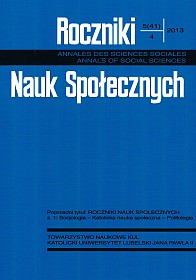Family as a Component of Identity
Abstract
Family and identity are notions which often appear together. Talking about identity, we underline the role of previous socialisation in the family for the sake of constructing the picture of oneself. In turn, talking about family, we do not forget the roles which are bases to autodescriptions.
The presented text relates to the understanding of identity by secondary school youth and is based on the results of TST and the association test (of the notion identity).
Two models of defining oneself have been distinguished. The former is related to family bonds, whereas the latter – with personality traits. Women defined themselves in the context of family bonds and roles more often than men.
References
Bokszański Z., Tożsamość interakcja grupa, Łódź: Wyd. Uniwersytetu Łódzkiego 1989.
Hardyment C., Rodzina, przeł. K. Bober, Warszawa: Wyd. Prószyński i S-ka 1999.
Dyczewski L., Rodzina twórcą i przekazicielem kultury, Lublin: TN KUL 2003.
Dyczewski L., Trwałość i zmienność kultury polskiej, Lublin: Wojewódzki Dom Kultury 2002.
Giddens A., Nowoczesność i tożsamość, „ja” i społeczeństwo w epoce późnej ponowoczesności, Warszawa: PWN 2010.
Foote N. N., Identification as the Basis for a Theory of Motivation, “American Journal of Sociology”, 50/1951.
JanPaweł II, List do rodzin, Częstochowa, Biblioteka Niedzieli 1994.
Kuhn M., McPartland T., An empirical investigation of self-attrubiutes, “American Sociological Review” 19(1954), s. 68-76.
Slany K., Alternatywne formy życia małżeńsko-rodzinnego w ponowoczesnym świecie, Kraków: Zakład Wydawniczy NOMOS 2002.
Straus A., Mirrors and Masks, The Sociological Press, 1969.
Turner J., Oakes P., The significance of the social identity concept for social psychology with reference to individualism, interactionism and social influence, “British Journal of Social Psychology” 25(3) (1986), s.237-252.
Tajfel H., Social stereotypes and social grups, w: Intergrup behaviour, red. J.C. Turner, H. Giles, Chicago: Univeristy of Chicago Press 1981, s. 144-167.
Rosa A.S. de, Reality changes faster than research: National and Supranational Identity in Social representation of the European Community in the Context of Changes in Internetional Relations, w: Changing European Identites: Social Psychological Analyses of Social Change, eds. G.M. Breakwell, E. Lyons, Oxford: Butterworth-Heinemann 1996, s. 381-402.
Turner J. H., Struktura teorii socjologicznej, Warszawa: PWN 2012.
Trutkowski C., Teoria społecznych reprezentacji i jej zastosowania. w: Wymiary życia społecznego. Polska na przełomie XX i XXI wieku, red. M. Marody, Warszawa: Wydawnictwo Naukowe Scholar 2007.
Wagner W., Duveen W. G., Farr R., Jovchelovitch S., Lorenzi-Cioldi F., Markova I., Rose D., Theory of methodof social representations, “Asian Journal of Social Psychology” 2(1999), s. 95-125.
Weigert A. J., Hastings R., Identity Loss, Family and Social Change, “American Journal of Sociology”, vol. 82, no 6 (May 1977).
Zagadnienia małżeństwa i rodziny w perspektywie feministyczno-genderowej, red. K. Slany, Kraków: Wyd. UJ 2013.
Copyright (c) 2013 Roczniki Nauk Społecznych

This work is licensed under a Creative Commons Attribution-NonCommercial-NoDerivatives 4.0 International License.


